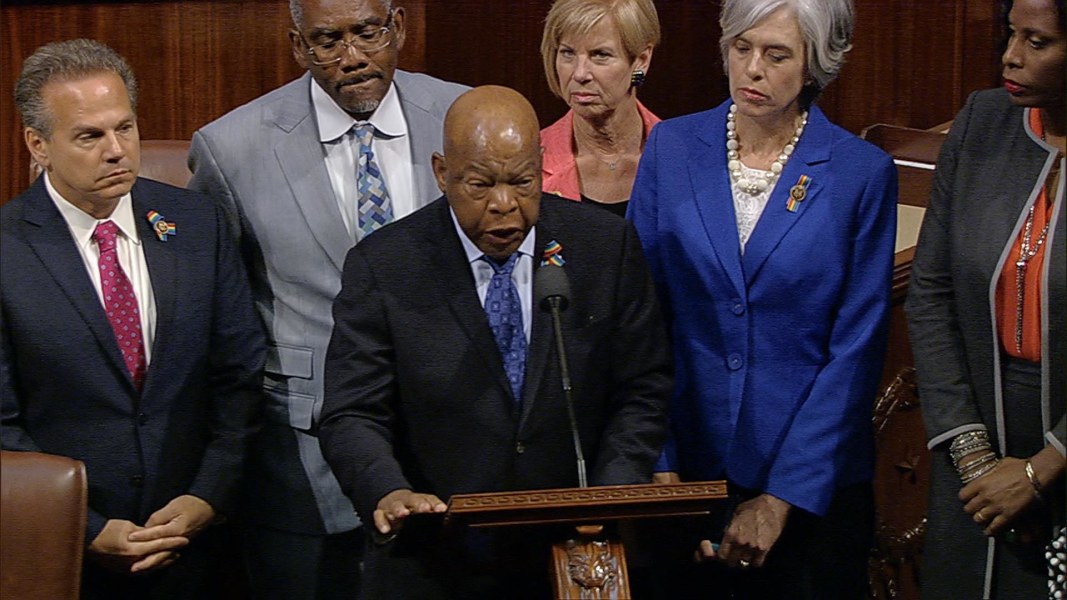
This is a placeholder text
Group text
by Prager on 24 June 2016 - 14:06
No that is where you are wrong. They will find new means of killing. Often much more deadlier then shooting. Timothy McVeigh had all the gus he could get, yet with fertilizer he killed more then the orlando or sandy hook terrorists.
And prime example 9/11 all the terrorists had were box cutters.
by GSD Admin on 24 June 2016 - 14:06
by Prager on 24 June 2016 - 14:06
beetree: Once again, the proof is there in Australia. They did it, and they have the statistics to prove it works.
Answer. There is not such proof. Proof implies logic This argument is not logical . This is logical fallacy where supposedly correlation proves causation. But the fact is that correlation does not imply causation, This fallacy is an old one but good one and used often. post hoc ergo propter hoc ( "after this, therefore because of this.") Post hoc is a particularly tempting error in logic, because temporal sequence appears to be integral to causality. The fallacy lies in coming to a conclusion based solely on the order of events, rather than taking into account other factors that might rule out the connection.
Australia got rid of guns thus that is why there are no mass killings.
Of course mass killings in Australa continued in same pace if not faster:
| Snowtown murders | August 1992 – May 1999 | Snowtown, South Australia | 12 dead | unknown | attack by John Bunting, Robert Wagner, and James Vlassakis, a total of 12 bodies were found in acid filled barrels and rainwater tanks |
| Childers Palace Backpackers fire | 23 June 2000 | Childers, Queensland | 15 dead | unknown | Arson attack by Robert Paul Long, which killed 15 international backpackers |
| Monash University Shooting | 21 October 2002 | Melbourne, Victoria | 2 dead | 5 | A shooting spree by Huan Yun Xiang, a student at Monash University |
| Churchill Fire | 7 February 2009 | Churchill, Victoria | 10 dead | unknown | Arson attack by Brendan Sokaluk that killed 10 people, during the Black Saturday bushfires period |
| Lin family murders | 18 July 2009 | North Epping, New South Wales | 5 dead | unknown | Blunt instrument attack which killed 5 members of the Lin family |
| 2011 Hectorville siege | 29 April 2011 | Hectorville, South Australia | 3 dead | 3 | A shooting that took place on 29 April 2011, in Hectorville, South Australia. It began after a 39-year-old male, Donato Anthony Corbo, shot four people on a neighbouring property (three of whom died), and also wounded two police officers, before being arrested by Special Operations police after an eight-hour siege.[9] |
| Quakers Hill Nursing Home Fire | 18 November 2011 | Sydney, NSW | 11 dead | Arson attack by Roger Kingsley Dean, a nurse, which killed 11 people | |
| Hunt family murders | 9 September 2014 | Lockhart, New South Wales | 5 dead | 0 | Murder-suicide shooting spree by Geoff Hunt who killed his wife and three children before turning the gun on himself |
| Logan shooting | 22 October 2014 | Logan, Victoria | 3 dead | 0 | A shooting murder of a neighbour family (Greg Holmes, 48, his mother Mary Lockhart, 75, and her husband Peter Lockhart, 78) by Ian Francis Jamieson, 63.[10] |
| Cairns child killings | 19 December 2014 | Cairns, Queensland | 8 dead | 1 (self-inflicted by perpetrator) | Stabbing attack. 8 children aged 18 months to 15 years killed. Thirty-seven-year-old woman also found injured. The woman, Raina Mersane Ina Thaiday, was later charged with the murder of the children, 7 of whom were hers, plus her niece.[11] |
Here is a total list including time before the ban. You will see that in 20 century Australia was never big on mass killing. Thus the ban proves nothing.
https://en.wikipedia.org/wiki/List_of_massacres_in_Australia
by GSD Admin on 24 June 2016 - 14:06
The proof is right here in this country think pre-2000s.
http://www.newyorker.com/magazine/2016/06/27/after-orlando-examining-the-gun-business
by Prager on 24 June 2016 - 14:06
by GSD Admin on 24 June 2016 - 14:06
Looks like you are grasping at straws. You can't compare these to gun deaths. ^ "This is logical fallacy where supposedly correlation proves causation."^
by joanro on 24 June 2016 - 15:06
Get rid of the current administration, bar hitlary and this can be turned around; http://www.breitbart.com/national-security/2016/06/24/6-things-obama-doesnt-want-know-isis/
by beetree on 24 June 2016 - 16:06
This is what I was talking about...
No Mass Shootings in Australia in 20 Years: How Did They Do It?
Mass shootings stopped in Australia after strict new gun laws passed, researchers reported Wednesday.
And overall deaths from firearms have fallen since the 1997 law, which banned certain semi-automatic and pump-action weapons and forced owners to sell them back to the government, the team reported in the Journal of the American Medical Association.
"Following enactment of gun law reforms in Australia in 1996, there were no mass firearm killings through May 2016," Simon Chapman of the University of Sydney and colleagues wrote.
They say they can't prove the gun control measures caused the fall in gun-related deaths, but say they are worth discussing.
Related: New GOP Gun Bill Aims to Block People on Watch Lists
- Google Plus
- Embed
Democrats Stage Sit-In on House Floor for Gun Legislation2:01
The mass shooting that prompted Australia's crackdown happened in Tasmania, in 1996, when 28-year-old Martin Bryant shot and killed 35 people in a café. Another 23 were injured.
Just weeks before, a gun enthusiast shot and killed 16 screaming first-graders and their teacher in an elementary school in Dunblane, Scotland. Britain enacted a handgun ban soon afterwards.
Australia already had strict rules about handguns, but a revolted public backed wider reforms that banned rapid-fire long guns and forced the buyback of nearly 660,000 weapons.
Chapman's team analyzed death statistics to see what effect the laws have had.
"From 1979-1996 (before gun law reforms), 13 fatal mass shootings occurred in Australia, whereas from 1997 through May 2016 (after gun law reforms), no fatal mass shootings occurred," they wrote.
Related: The Mass Shooting That Changed Australia's Gun Laws
They were able to show that people didn't find other ways to kill or to die by suicide — rates of homicide and suicide fell overall also. Because these rates tumbled, Chapman's team said, they cannot show that the gun control measures were responsible.
One other Australian study showed that gun-related homicides decreased 7.5 percent per year following the reforms.
Daniel Webster, a researcher specializing in gun violence at Johns Hopkins University's Bloomberg School of Public Health, says it's doubtful the U.S. could do anything similar.
"Political, cultural, and legal challenges make it highly unlikely that the United States would implement comparable policies," Webster wrote in a commentary in JAMA.
"Yet the experience in Australia over the past 2 decades since enactment of the NFA National Firearms Agreement provides a useful example of how a nation can come together to forge life-saving policies despite political and cultural divides."
Related: The Orlando Nightclub Massacre
The study was done to mark the 20th anniversary of the Australian law, but it coincides with a push in Congress to enact some sort of gun control measures after a mass shooting at an Orlando nightclub in which a gunman killed 49 people.
Gun control is a bitter and divisive issue in the U.S. and just this week the Senate suppressed four measures that would have limited who can buy automatic weapons.
The U.S. has an exceptionally high share of gun violence.Research shows 31 percent of the world's mass shootings occur in the U.S., where rough estimates suggest there are 300 million firearms.
Americans are seven times more likely to be murdered than people in 12 similar developed countries, and 20 times more likely to be killed by a gun.
Gun death rates in the U.S. were 11.2 per 100,000 people in 2015. That compares to a rate of 1.2 per 100,000 people in Australia.
A 2014 study found that guns hurt or kill about 10,000 American children each year.
"If U.S. firearm homicide rates were only 10 times as high as firearm homicide rates in Australia, rather than 23 times as high, there would be substantially fewer homicides," Webster noted.
Last week, the American Medical Association voted to join the debate, promising to start lobbying Congress to enact some measures.
by GSD Admin on 24 June 2016 - 16:06
by Hundmutter on 24 June 2016 - 19:06
@Prager - it's not really about "banning weapons", it is about putting sensible measures in place to restrict sales and identify people who can't be trusted to have guns, before during or after trouble.
@Joan - yes of course I voted for UK to remain in the EU. I had already made up my own mind weeks ago, but were I to have been relying, towards the date of the ballot, on the Stay / Leave campaigns, if you think I'd take any notice of a bigoted numbskull like Farage, instead of the Stay urging by people of the intellectual capacity of Stephen Hawkings, then you are a good deal more stupid than you are implying I must be.
Contact information Disclaimer Privacy Statement Copyright Information Terms of Service Cookie policy ↑ Back to top





